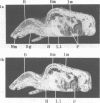Abstract
The distribution of 14C after the administration of 14C-formaldehyde was studied in pregnant mice by a whole body low temperature autoradiographic technique. The concentrations of formaldehyde and its metabolites in maternal and fetal blood and tissues were determined in unsectioned tissues by liquid scintillation spectrophotometry. The binding of 14C from 14C-formaldehyde to cells and DNA in maternal and fetal mouse liver was also measured. Radioactivity of 14C deriving from 14C-formaldehyde was found immediately after injection, and showed strong accumulation and retention three hours after injection. The organs that had high concentrations at all studied survival intervals were maternal liver, intestinal mucosa, bone marrow, kidneys, and salivary glands. Considerable amounts of radioactivity were found in the fetuses at six hours after injection, and the concentrations were almost the same as in the maternal tissues. The elimination of 14C-formaldehyde and metabolites from the placenta and fetus occurred more slowly than from maternal tissue.
Full text
PDF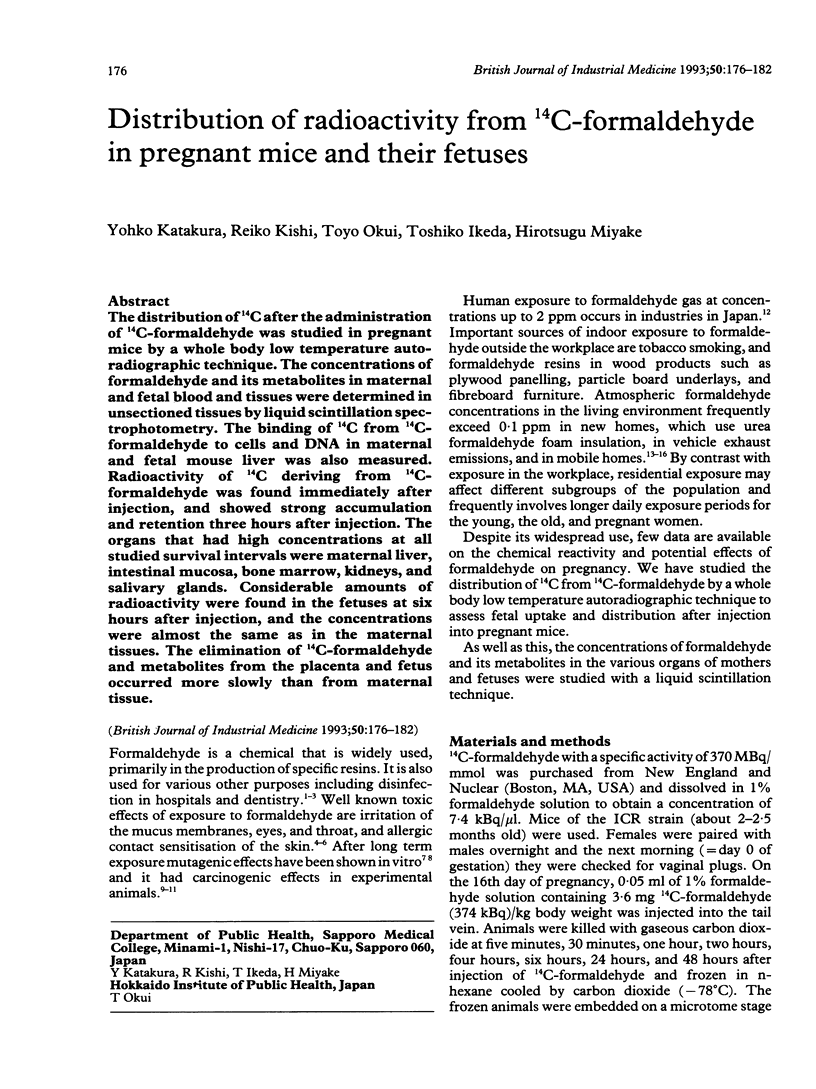
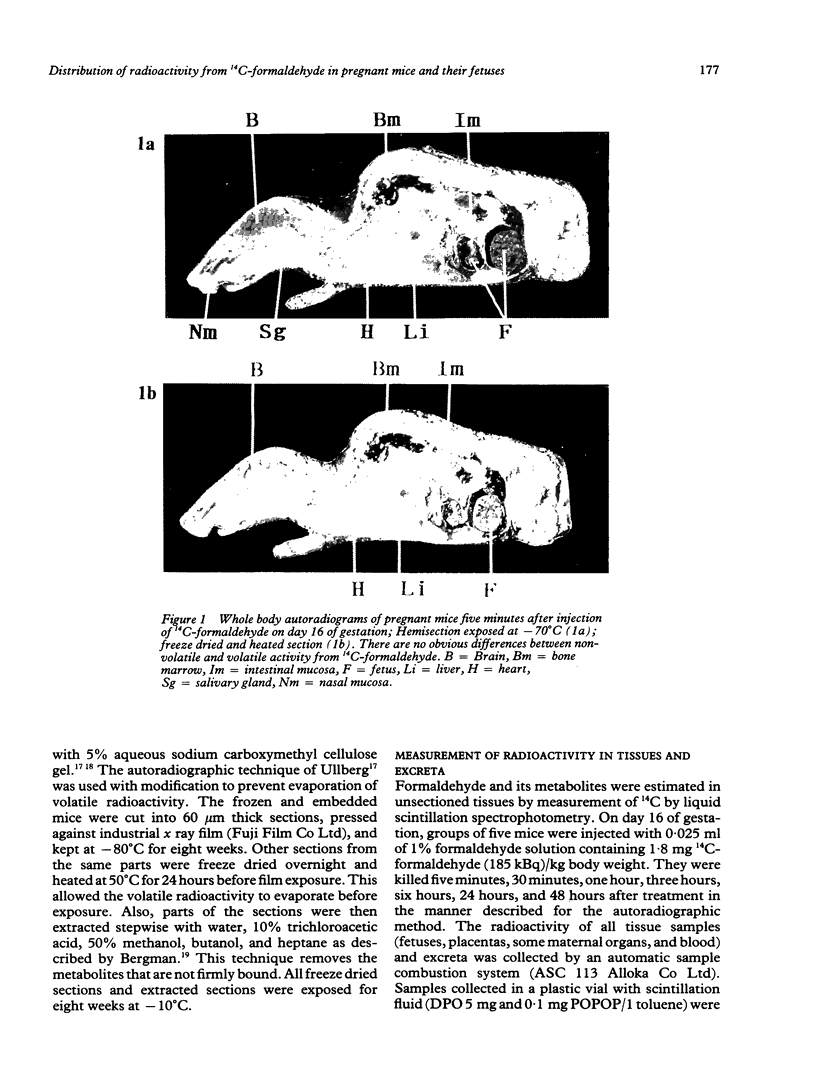
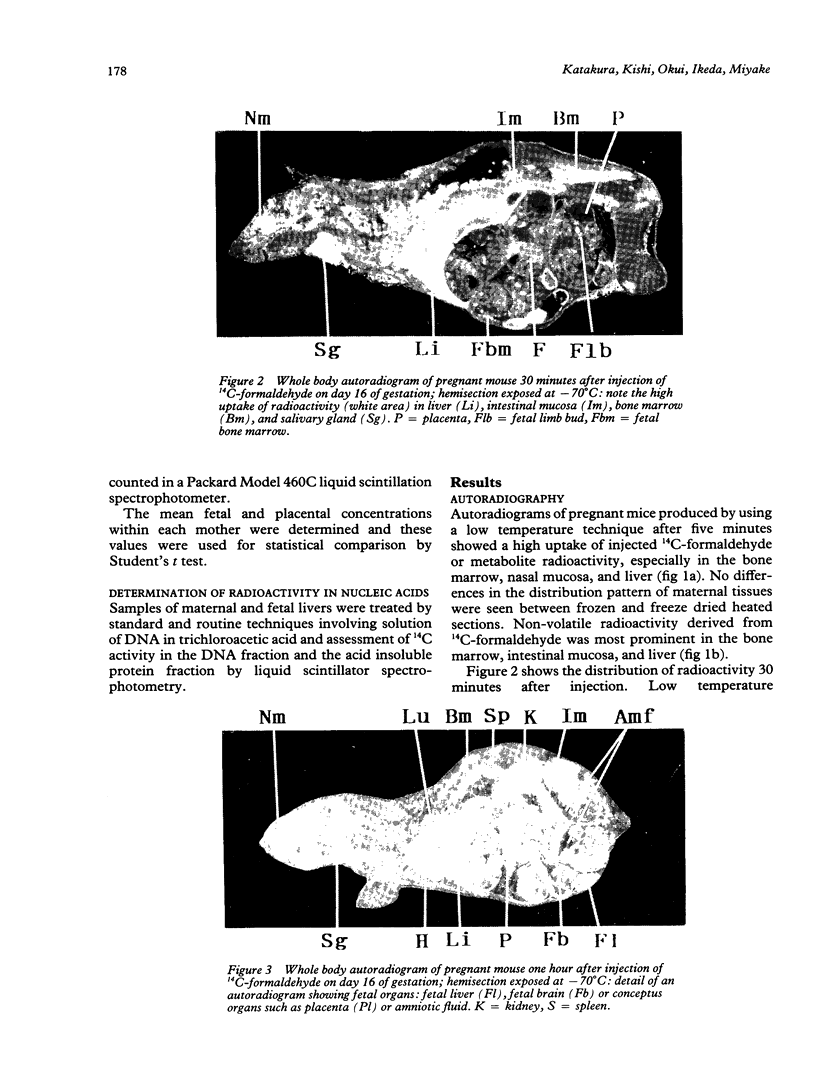
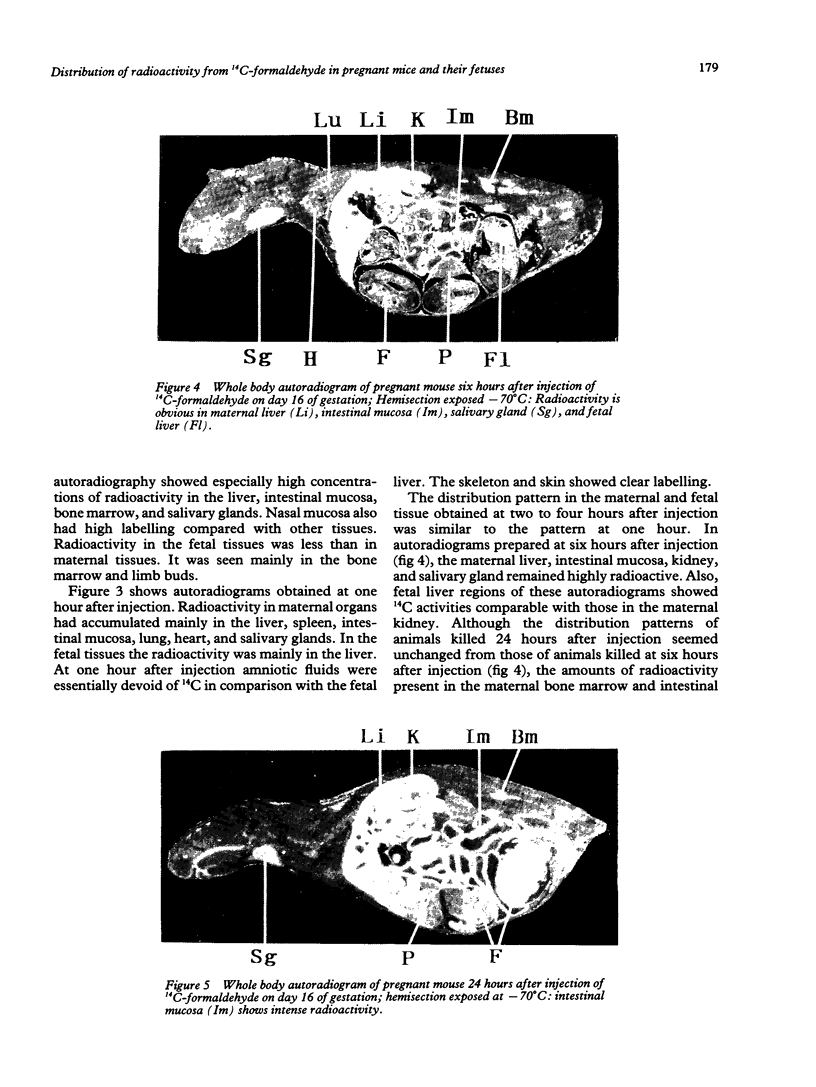
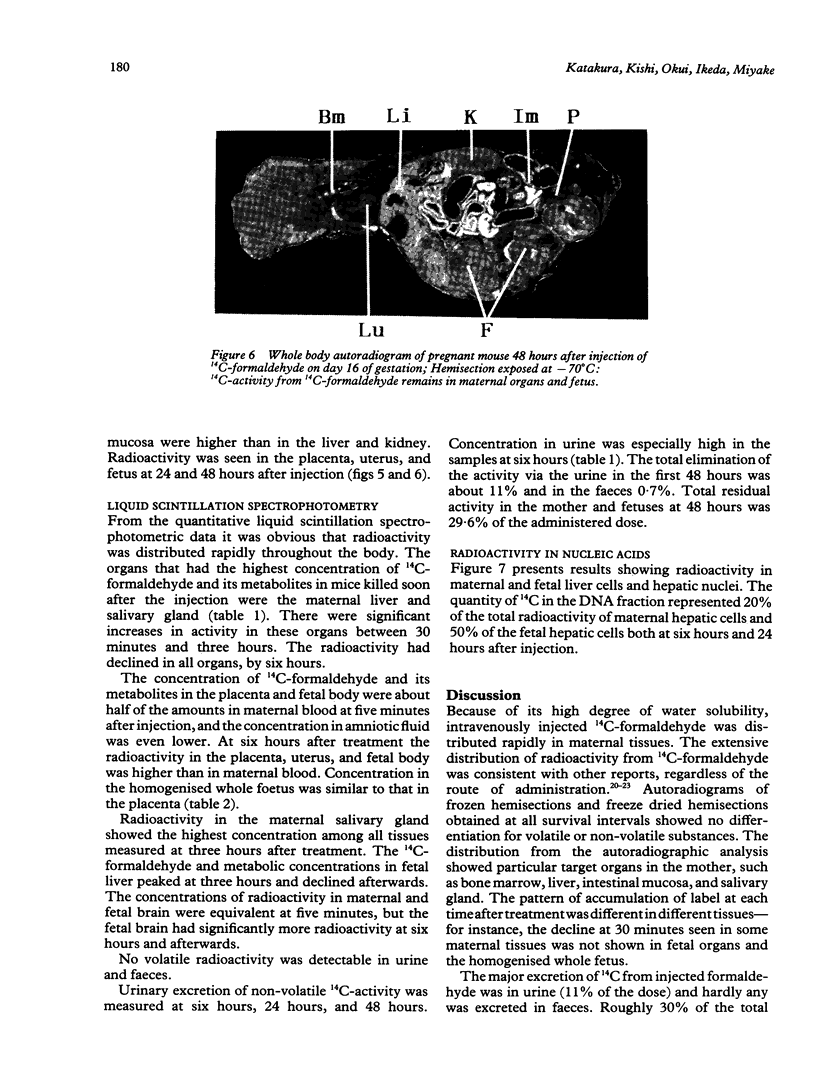

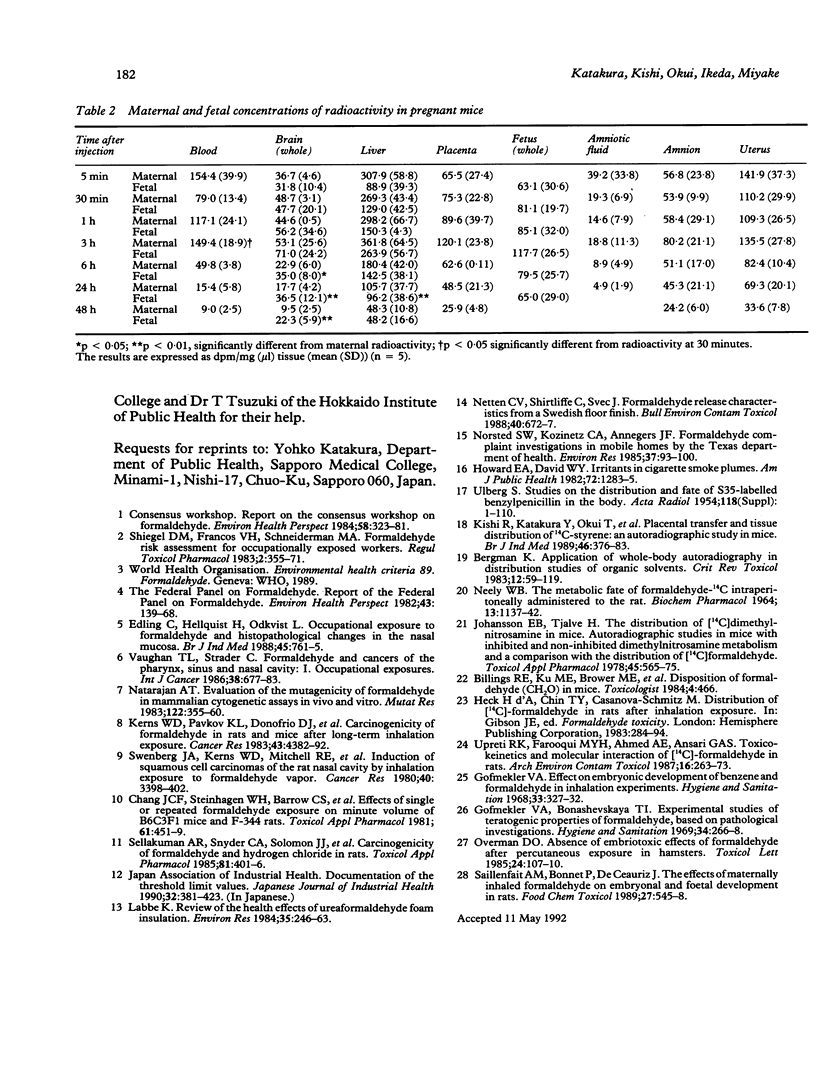
Images in this article
Selected References
These references are in PubMed. This may not be the complete list of references from this article.
- Ayer H. E., Yeager D. W. Irritants in cigarette smoke plumes. Am J Public Health. 1982 Nov;72(11):1283–1285. doi: 10.2105/ajph.72.11.1283. [DOI] [PMC free article] [PubMed] [Google Scholar]
- Bergman K. Application and results of whole-body autoradiography in distribution studies of organic solvents. Crit Rev Toxicol. 1983;12(1):59–118. doi: 10.3109/10408448309029318. [DOI] [PubMed] [Google Scholar]
- Chang J. C., Steinhagen W. H., Barrow C. S. Effect of single or repeated formaldehyde exposure on minute volume of B6C3F1 mice and F-344 rats. Toxicol Appl Pharmacol. 1981 Dec;61(3):451–459. doi: 10.1016/0041-008x(81)90368-9. [DOI] [PubMed] [Google Scholar]
- Edling C., Hellquist H., Odkvist L. Occupational exposure to formaldehyde and histopathological changes in the nasal mucosa. Br J Ind Med. 1988 Nov;45(11):761–765. doi: 10.1136/oem.45.11.761. [DOI] [PMC free article] [PubMed] [Google Scholar]
- Johansson E. B., Tjälve H. The distribution of [14C]dimethylnitrosamine in mice. Autoradiographic studies in mice with inhibited and noninhibited dimethylnitrosamine metabolism and a comparison with the distribution of [14C]formaldehyde. Toxicol Appl Pharmacol. 1978 Aug;45(2):565–575. doi: 10.1016/0041-008x(78)90118-7. [DOI] [PubMed] [Google Scholar]
- Kerns W. D., Pavkov K. L., Donofrio D. J., Gralla E. J., Swenberg J. A. Carcinogenicity of formaldehyde in rats and mice after long-term inhalation exposure. Cancer Res. 1983 Sep;43(9):4382–4392. [PubMed] [Google Scholar]
- Kishi R., Katakura Y., Okui T., Ogawa H., Ikeda T., Miyake H. Placental transfer and tissue distribution of 14C-styrene: an autoradiographic study in mice. Br J Ind Med. 1989 Jun;46(6):376–383. doi: 10.1136/oem.46.6.376. [DOI] [PMC free article] [PubMed] [Google Scholar]
- L'Abbé K. A., Hoey J. R. Review of the health effects of urea-formaldehyde foam insulation. Environ Res. 1984 Oct;35(1):246–263. doi: 10.1016/0013-9351(84)90133-6. [DOI] [PubMed] [Google Scholar]
- NEELY W. B. THE METABOLIC FATE OF FORMALDEHYDE-14-C INTRAPERITONEALLY ADMINISTERED TO THE RAT. Biochem Pharmacol. 1964 Aug;13:1137–1142. doi: 10.1016/0006-2952(64)90114-5. [DOI] [PubMed] [Google Scholar]
- Natarajan A. T., Darroudi F., Bussman C. J., van Kesteren-van Leeuwen A. C. Evaluation of the mutagenicity of formaldehyde in mammalian cytogenetic assays in vivo and vitro. Mutat Res. 1983 Dec;122(3-4):355–360. doi: 10.1016/0165-7992(83)90019-2. [DOI] [PubMed] [Google Scholar]
- Norsted S. W., Kozinetz C. A., Annegers J. F. Formaldehyde complaint investigations in mobile homes by the Texas Department of Health. Environ Res. 1985 Jun;37(1):93–100. doi: 10.1016/0013-9351(85)90052-0. [DOI] [PubMed] [Google Scholar]
- Overman D. O. Absence of embryotoxic effects of formaldehyde after percutaneous exposure in hamsters. Toxicol Lett. 1985 Jan;24(1):107–110. doi: 10.1016/0378-4274(85)90147-x. [DOI] [PubMed] [Google Scholar]
- Saillenfait A. M., Bonnet P., de Ceaurriz J. The effects of maternally inhaled formaldehyde on embryonal and foetal development in rats. Food Chem Toxicol. 1989 Aug;27(8):545–548. doi: 10.1016/0278-6915(89)90051-3. [DOI] [PubMed] [Google Scholar]
- Sellakumar A. R., Snyder C. A., Solomon J. J., Albert R. E. Carcinogenicity of formaldehyde and hydrogen chloride in rats. Toxicol Appl Pharmacol. 1985 Dec;81(3 Pt 1):401–406. doi: 10.1016/0041-008x(85)90411-9. [DOI] [PubMed] [Google Scholar]
- Siegel D. M., Frankos V. H., Schneiderman M. A. Formaldehyde risk assessment for occupationally exposed workers. Regul Toxicol Pharmacol. 1983 Dec;3(4):355–371. doi: 10.1016/0273-2300(83)90006-5. [DOI] [PubMed] [Google Scholar]
- Swenberg J. A., Kerns W. D., Mitchell R. I., Gralla E. J., Pavkov K. L. Induction of squamous cell carcinomas of the rat nasal cavity by inhalation exposure to formaldehyde vapor. Cancer Res. 1980 Sep;40(9):3398–3402. [PubMed] [Google Scholar]
- Upreti R. K., Farooqui M. Y., Ahmed A. E., Ansari G. A. Toxicokinetics and molecular interaction of [14C]-formaldehyde in rats. Arch Environ Contam Toxicol. 1987 May;16(3):263–273. doi: 10.1007/BF01054943. [DOI] [PubMed] [Google Scholar]
- Vaughan T. L., Strader C., Davis S., Daling J. R. Formaldehyde and cancers of the pharynx, sinus and nasal cavity: I. Occupational exposures. Int J Cancer. 1986 Nov 15;38(5):677–683. doi: 10.1002/ijc.2910380510. [DOI] [PubMed] [Google Scholar]
- van Netten C., Shirtliffe C., Svec J. Formaldehyde release characteristics from a Swedish floor finish. Bull Environ Contam Toxicol. 1988 May;40(5):672–677. doi: 10.1007/BF01697513. [DOI] [PubMed] [Google Scholar]



